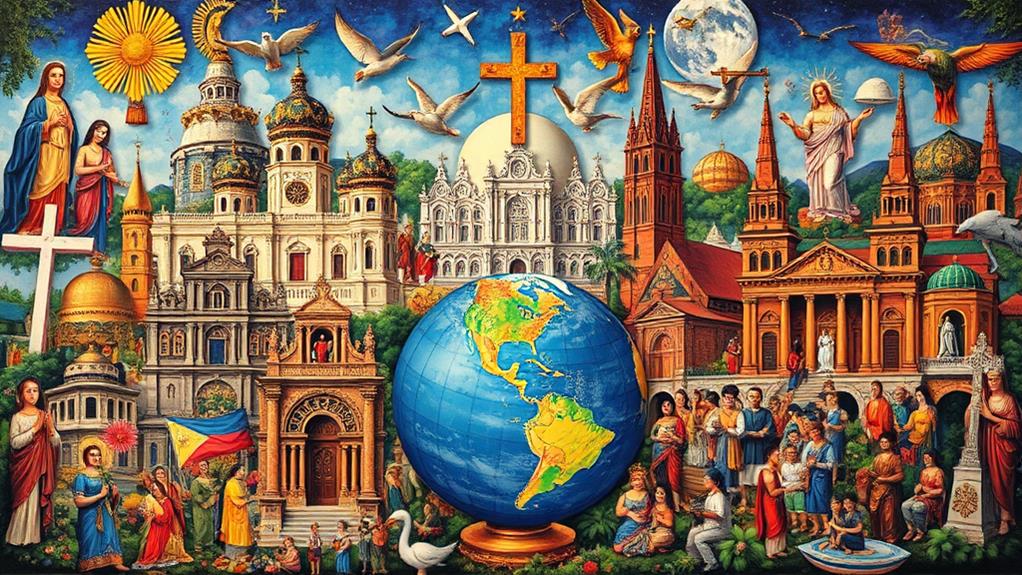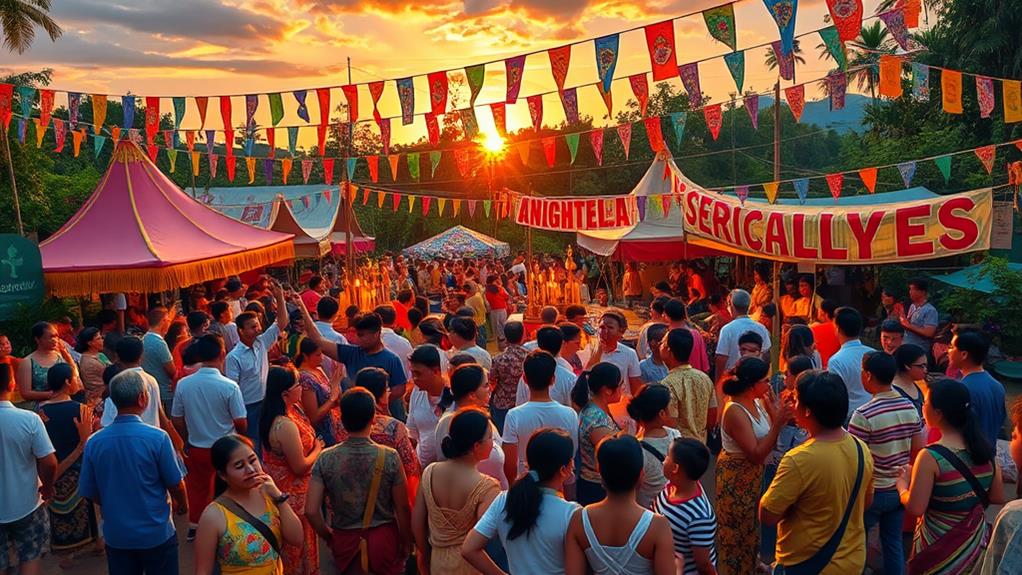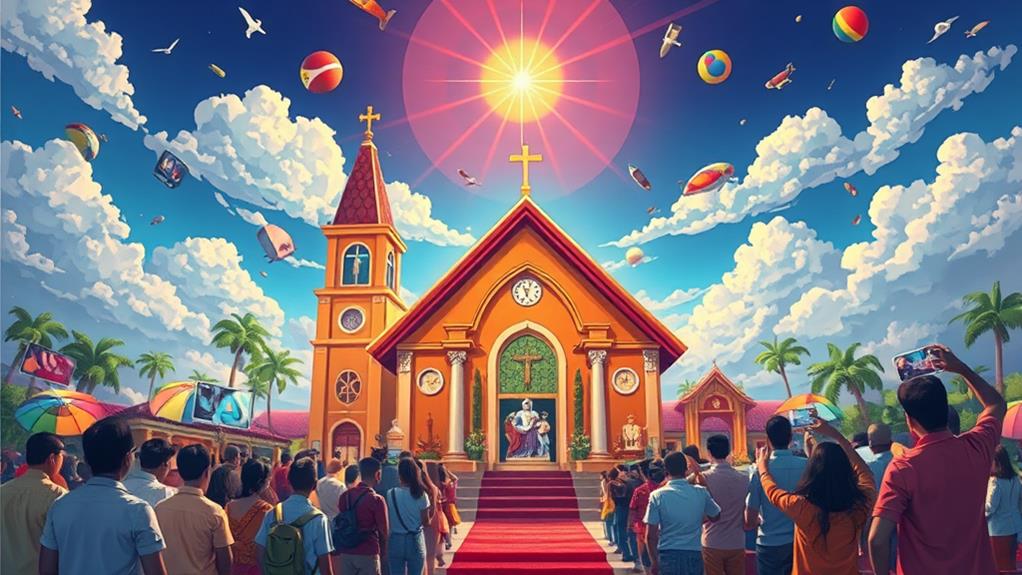Globalization is reshaping Filipino religious beliefs. Today, nearly 80% of Filipinos combine traditional faith practices with modern spiritual movements, resulting in a unique blend of Catholicism, Islam, and emerging beliefs.
The internet plays a significant role in facilitating connections among diverse faith communities, contributing to this fusion.
Younger generations are seeking personal meaning. This has led to the rise of movements like El Shaddai, which emphasizes individual empowerment.
For instance, El Shaddai's focus on personal relationships with God and community service resonates with many young Filipinos.
Interfaith dialogue and grassroots cooperation are fostering tolerance. As a result, there is a growing acceptance of diverse religious beliefs and practices.
This shift is redefining what it means to be religious in the Philippines, with implications that will continue to evolve in the future.
Historical Development of Religion

Indigenous Beliefs
Before foreign influences, indigenous Filipinos practiced a rich tapestry of beliefs centered around a pantheon of gods and spirits, with Bathala as the supreme deity. This indigenous culture thrived for centuries, shaping daily lives with traditional values.
Introduction of Islam
The historical development of religion in the Philippines took a significant turn with the introduction of Islam around 1350.
Islam established advanced political structures, especially in Mindanao and Sulu.
Spanish Colonization and Catholicism
The Spanish colonization beginning in 1565 marked a pivotal shift, as Catholicism became the dominant faith.
Catholicism often intermingled with local animistic beliefs, creating unique practices that resonate with Filipino identity.
American Period and Protestantism
The American period later introduced Protestantism and a wave of educational reforms, leading to the rise of nationalized churches like the Aglipayans.
Evolving Religious Landscape
As globalization unfolds, the Philippines witnesses an evolving religious landscape.
New sects and fundamentalist groups challenge the Catholic Church's supremacy, reflecting a dynamic interplay between historical beliefs and modern influences.
This ongoing transformation underscores the resilience of indigenous cultures in the face of external pressures.
Modern Influences on Faith
Globalization's Impact on Filipino Faith
Globalization is reshaping the world, and its effects on Filipino faith are becoming increasingly apparent. The modern landscape is characterized by a dynamic interplay between traditional Catholicism and emerging religious movements that challenge its dominance.
The internet and social media have facilitated greater interaction among diverse faith communities, allowing new ideas to flourish. This connectivity has led to a unique blend of indigenous beliefs and foreign influences, exemplifying syncretism as a response to globalization's pressures on cultural identity.
Economic Changes and Spiritual Expressions
Economic transformations driven by globalization have transformed spiritual expressions.
Movements like El Shaddai attract individuals seeking alternative guidance amidst rapid socio-economic changes. In this context, spirituality becomes a refuge, reflecting the desire for community and support in a changing world.
The Rise of Individualistic Spirituality
Individualistic spirituality is on the rise, particularly among younger generations. They seek personal meaning and relevance in their faith, navigating the complexities of the modern world.
This shift toward individualized beliefs highlights the ongoing evolution of Filipino religious identity, blending tradition with contemporary influences while negotiating the challenges posed by globalization.
The Rise of New Spiritual Movements

The Rise of New Spiritual Movements in the Philippines
The Philippines has witnessed a significant shift in its religious landscape, driven by the emergence of new spiritual movements that blend traditional practices with modern influences.
El Shaddai, a movement that emerged in the 1980s, is a prime example, combining Roman Catholic practices with charismatic expressions and indigenous beliefs. Its emphasis on prosperity gospel and community support has captivated millions, demonstrating how globalization can foster local spiritual adaptations.
New spiritual movements appeal to many due to their promise of personal empowerment and spiritual fulfillment. In contrast to mainstream Catholicism, these movements offer alternative religious expressions that provide deeper connections and relevance in faith.
For instance, many Filipinos find solace in the charismatic expressions and community support offered by El Shaddai, which diverges from traditional Catholicism.
While the Aglipayans, once a dominant force, have seen their numbers decline, new spiritual movements continue to thrive.
They leverage technology and global networks to expand their reach, redefining religious beliefs in the Philippines and highlighting the interplay between globalization and local spiritual practices. This ongoing evolution has created a unique tapestry of belief in a rapidly changing world.
How Has Globalization Impacted Religious Practices and Beliefs in the Philippines?
Globalization has significantly influenced religious practices and beliefs in the Philippines. With the influx of new ideas and cultures, traditional religious practices have evolved. The religion and healthcare philippines article highlights the intersection of globalization, modern healthcare, and traditional religious beliefs, which has created a complex and nuanced landscape in the country.
Globalization and Religious Tolerance
Globalization has created an environment in the Philippines where different faith communities can engage in dialogue and understanding.
Interfaith Dialogue is crucial in promoting religious tolerance. For instance, the Tony Blair Faith Foundation's Face to Faith program equips Filipino youth with the skills to engage with different faiths respectfully. This program has brought together students from various religious backgrounds to discuss their beliefs and values, fostering a deeper understanding among them.
Grassroots Movements are also essential in promoting religious cooperation. Local efforts, such as the Philippine Council of Evangelical Churches, encourage religious cooperation and combat extremism. These movements promote peaceful coexistence by engaging religious leaders and communities in dialogue and joint activities.
Digital Platforms have made it possible for people to access diverse religious information, fostering a more informed and tolerant society. Online resources, such as the website of the National Commission on Muslim Filipinos, provide information on different religious beliefs and practices, promoting understanding and respect among Filipinos.
Education plays a vital role in promoting religious tolerance in the Philippines. Government-supported programs are integrating faith-based initiatives that enhance tolerance and understanding in multicultural settings.
For example, the Department of Education's Values Education program includes modules on religious diversity and tolerance, aiming to cultivate a culture of respect among religious groups.
Future Directions in Filipino Faith

Future Directions in Filipino Faith
Globalization Shapes Filipino Spirituality
The future of Filipino faith is being reshaped by the interplay between traditional communities and new religions.
This interplay is driven by the influence of globalization on religious dynamics, leading to the emergence of new movements that address contemporary issues while preserving cultural identity.
Interfaith Dialogue Fosters Understanding
Interfaith dialogue is becoming increasingly important in promoting peaceful coexistence among diverse groups.
Initiatives like the Tony Blair Faith Foundation's Face to Faith program equip future leaders with effective communication and collaboration skills.
Such educational efforts are vital for fostering understanding among different faith groups.
Grassroots Movements Promote Inclusion
Grassroots movements and local clergy are countering the rise of fundamentalist ideologies by emphasizing the social role of faith in conflict resolution and community cohesion.
Government support for faith-based programs recognizes religion's potential to unite rather than divide.
This trend highlights the importance of embracing diversity and fostering an inclusive society in an increasingly globalized world.
Questions and Answers
How Does Globalization Affect Religious Beliefs?
Globalization promotes cultural exchange and religious pluralism, influencing religious beliefs. This exchange allows communities to adapt spiritually to modernization effects and transnational influences.
For instance, the growth of Buddhism in the West is a result of cultural exchange, where Westerners are drawn to its philosophical and meditative aspects.
As a result, individuals explore diverse faiths, shaping their understanding of spirituality. This exploration leads to the discovery of new forms of worship or alternative practices.
For example, the increasing popularity of yoga in the West is a result of cultural exchange, where people incorporate its physical and spiritual aspects into their daily lives.
This process of spiritual adaptation is a continuous response to global changes and local needs. As globalization continues to shape the world, individuals will continue to adapt their religious beliefs to accommodate new cultural and spiritual influences.
What Are the Effects of Globalization on Our Philippine Culture?
Globalization's Impact on Philippine Culture
Globalization has significantly affected Philippine culture, resulting in a blend of traditional practices and modern influences. This cultural fusion is evident in the Philippines' music, where traditional folk songs are combined with modern genres like rock and pop. For instance, the traditional Filipino instrument, the kulintang, is often used in contemporary music festivals.
However, this cultural exchange can lead to an identity crisis, as Filipinos struggle to balance traditional values with modern norms. The increased popularity of Western-style fast food, for example, has led to a decline in the consumption of traditional Filipino dishes like adobo and sinigang.
Religious syncretism is another effect of globalization on Philippine culture. This is seen in the coexistence of Catholicism, Islam, and indigenous beliefs, which can sometimes challenge the country's cultural roots. For example, the Filipino celebration of the Ati-Atihan festival, which honors the Santo Niño, has incorporated indigenous and Catholic traditions.
Ultimately, the impact of globalization on Philippine culture requires a delicate balance between preserving traditional practices and embracing modern influences. By doing so, Filipinos can maintain their unique cultural identity while still being open to new ideas and experiences.
What Are the Religious Beliefs of the Filipinos?
Filipinos primarily practice Catholicism, which is deeply rooted in their culture. This is because the Philippines was a Spanish colony for over three centuries, during which time Catholicism was introduced and became widespread. As a result, around 86% of the population identifies as Catholic.
Indigenous practices and folk beliefs are also present in Filipino religious beliefs. For example, many Filipinos believe in superstitions such as avoiding certain actions or objects that are believed to bring bad luck. Additionally, some Filipinos practice animism, which is the belief that non-human entities, such as animals or natural elements, possess spiritual powers.
Family values and moral teachings play a crucial role in shaping Filipino faith. In Filipino culture, family is highly valued, and religious beliefs often emphasize the importance of family and community. Moral teachings, such as respecting elders and prioritizing family obligations, are also deeply ingrained in Filipino religious practices.
Religious festivals and celebrations are an integral part of Filipino culture. These festivals, such as the Sinulog Festival in Cebu and the MassKara Festival in Bacolod, showcase community bonds and cultural identity. They often feature colorful parades, traditional dances, and feasting, and are an important way for Filipinos to express their faith and cultural heritage.
What Role Does Technology Play in the Globalization of Religion?
Technology has transformed the globalization of religion by providing digital platforms for outreach and community-building. Through social media, people from diverse religious backgrounds interact, promoting religious pluralism.
For instance, Facebook groups and online forums enable individuals to discuss and debate religious topics, fostering a deeper understanding of different beliefs.
Faith-based apps have facilitated cultural exchange, allowing users to explore various religious practices and teachings. Examples include apps like Quran Pro, which provides Islamic teachings and prayer guides, and apps like Headspace, which offers meditation and mindfulness exercises inspired by Buddhism.
These digital tools empower individuals to engage with different faiths, shaping their spiritual journey and promoting a more inclusive understanding of religion in a rapidly changing world.